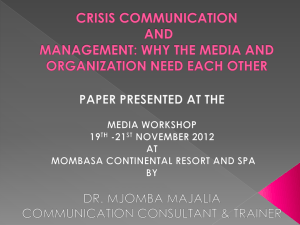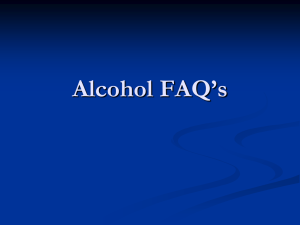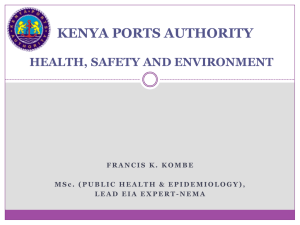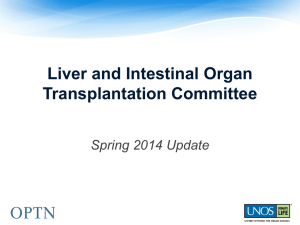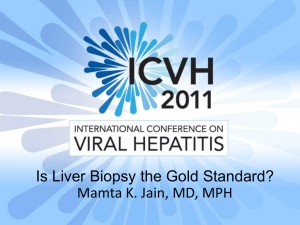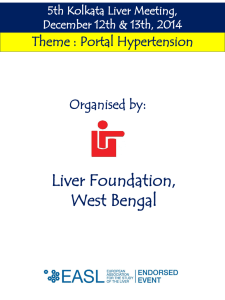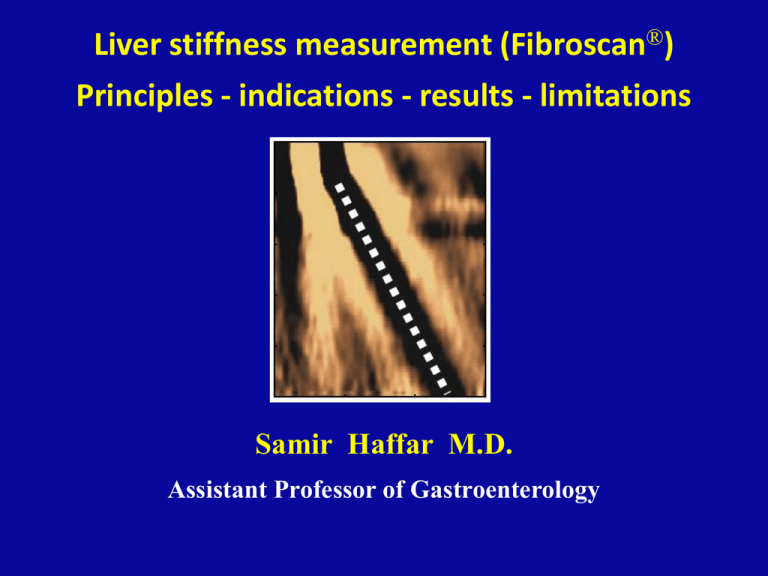
Liver stiffness measurement (Fibroscan®)
Principles - indications - results - limitations
Samir Haffar M.D.
Assistant Professor of Gastroenterology
Clinical Examination
Biological work-up
Blood markers
Fibrose
FibroScan®
Hepatic biopsy
Imaging
(US, MRI, endoscopy)
Ideal non-invasive test for diagnosis
of liver fibrosis
• Simple
• Reproducible
• Readily available
• Less expensive than biopsy
• Predicts full spectrum of fibrosis
• Reflects changes occurring with therapy
Evaluation of chronic liver injury according
to health care level
Primary health care
Secondary health care
Tertiary health care
Liver biopsy
Physical examination
Liver function tests
Serum Hyaluronate
APRI or other simple tests
Ultrasound
Fibroscan®
Fibroscan®
ARFI*
Serum markers &
algorithms
MR elastography*
HVPG
* Promising but currently under investigation
ARFI: Acoustic Radiation Force Impulse Imaging
HVPG: Hepatic Venous Pressure Gradient
Castéra L et al. Gut 2010 ; 59 : 861 – 866.
Liver stiffness
• Assessed by US (FibroScan®) & more recently by MRI
• Evaluates velocity of propagation of a shock wave
within liver tissue (examines a physical parameter of
liver tissue which is related to its elasticity)
• Rationale
Normal liver is viscous
Not favorable to wave propagation
Fibrosis increases hardness of tissue
Favors more rapid propagation
Bedossa P. Liver Int 2009 ; 29 (s1): 19 – 22.
Fibroscan® device
• Electronic platform
– Ultrasonic signals acquisition
– Numerical signal processing
• Integrated computer
– Stiffness measurement
– Examinations database
• Dedicated probes with unique
technology
Vibrator (50 Hz)
US Transducer
(3,5 MHz)
Fibroscan® (Echosens, Paris, France)
Position of probe & explored volume
Cylinder of 1 cm wide & 4 cm long
From 25 mm to 65 mm below skin surface
This volume is at least 100 times bigger than a biopsy sample
Results
Stiffness (kPa)
Median value of 10 shots
3.9 Kilo Pascals
IQR * (kPa)
Interval around median
Contains 50% of valid shots
≤ 25% of median value
At least 10 shots
Success Rate: ≥ 60%
Manufacturer’s criteria for LSM interpretation
• First step
Number of shots
≥ 10
• Second step
Success rate
≥ 60 %
• Third step
Interquantile range (IQR) ≤ 25%
Failure
Unreliable results
Zero valid shot
< 10 valid shots
Success rate ≤ 60%
IQR ≥ 25%
Liver stiffness values in healthy subjects
429 subjects
5.2 ± 1.5 kPa
5.8 ± 1.5 kPa
p = 0.0002
Roulot D et al. J Hepatol 2008 ; 48 : 606 – 613.
Liver stiffness values in healthy subjects
with & without metabolic syndrome
5.3 ± 1.5 kPa
6.5 ± 1.6 kPa
p < 0.0001
Roulot D et al. J Hepatol 2008; 48 : 606 – 613.
Liver stiffness cut-offs in chronic liver diseases
Matavir
F0-F1
Fibrosis
Mild
F2
F3
Sign Severe
F4
Cirrhosis
LSM 2.5 – 7 kPa → Mild or absent fibrosis is likely
LSM > 12.5 kPa
→ Cirrhosis is likely
Castéra L et al. J Hepatol 2008 ; 48 : 835 – 847.
Progression of fibrosis in viral hepatitis
Photomicrographs (magnification ×40; trichrome stains)
F0
F2
F1
F3
F4
Faria SC et al. RadioGraphics 2009 ; 29 : 1615 – 1635.
Perform LSM
≤ 6 kPa
Intermediate values
≥ 12 kPa
No significant fibrosis
Grey area
Advanced fibrosis
F0
F1
F2
F3
F4
F
No biopsy
Vizzutti et al. Gut 2009;58:156-60.
Biopsy if results
influence management
No biopsy
Implementation of
other NI tests
Treatment or
Follow-up
Shear wave propagation velocity according to
severity of hepatic fibrosis (Metavir score)
E = 3.0 kPa
F0
E = 7.7 kPa
F2
E = 27 kPa
F4
Sandrin L. Ultrasound Med Biol 2003 ; 29 : 1705 – 1713.
Liver stiffness for each Metavir stage in CHC
Box-and-whiskers plot
Hepatology 2005;41:48 – 54.
Gastroenterology 2005; 28:343 – 350.
Vertical axis is in logarithmic scale (wide range of F4 values)
Correlation between LSM & fibrosis stage
* Gastroentérol Clin Biol 2008;32,58-67.
** J Hepatol 2009;49:1062-68, Aliment Pharmacol Ther 2008;28:1188-98.
*** Hepatology 2010;51:454-62. Gastroentérol Clin Biol 2008;32:58-67.
Accuracy of a diagnostic test
• Dichotomous test (only 2 results)
Sensibility (Sn)
Specificity (Sp)
Positive Predictive Value (PPV)
Negative Predictive Value (NPV)
CIs
Likelihood Ratios + & – (LRs)
Diagnostic Odds Ratio (OR)
• Multilevel test (> 2 results)
Receiver Operating Characteristic (ROC)
Newman TB & Kohn MA. Evidence-based diagnosis.
Cambridge University Press, Cambridge, UK, 1st edition, 2009.
Hypothetical ROC curve
Pines JM & Everett WW. Evidence-Based emergency care: diagnostic testing & clinical
decision rules. Blackwell’s publishing, West Sussex, UK, 2008.
Accuracy of diagnostic test using AUC of ROC
Value
Accuracy
0.90 - 1.00
Excellent
0.80 - 0.90
Good
0.70 - 0.80
Fair
0.60 - 0.70
Poor
AUROC of a ‘‘good” test should be ≥ 0.80
Pines JM & Everett WW. Evidence-Based emergency care: diagnostic testing & clinical
decision rules. Blackwell’s publishing – West Sussex – UK – 2008.
Meta-analysis of TE for staging liver fibrosis
50 studies – random effect – all type of CLD
Cirrhosis (F4): 0.94
(95% CI: 0.93 – 0.95)
Cut-off value: 13.0 kPa
Severe fibrosis (F3): 0.89
(95% CI: 0.88 – 0.91)
Significant fibrosis (F2): 0.84
(95% CI: 0.82 – 0.86)
Cut-off value: 7.7 kPa
Friedrich R et al. Gastroenterology 2008 ; 134 : 960 – 974.
Significance of wide range of LSM in cirrhosis
13 - 75 kPa
2.5
13
26
36
49
53
62
75
EV stage 2 or 3
Child-Pugh B or C
Ascites
HCC ?
Variceal bleeding
Foucher J et al. Gut 2006 ; 55 : 403 – 408.
Cumulative incidence of HCC based on LSM
866 CHC – Mean follow-up 3 years
LSM > 25 kPa
HR 45.5 (p< 0.001)
20 < LSM ≤ 25
15 < LSM ≤ 20 kPa
10 < LSM ≤ 15 kPa
LSM ≤ 10 kPa
HR 25.6 (p< 0.001)
HR 20.9 (p< 0.001)
HR 16.7 (p< 0.001)
HR 0
LSM: Liver Stiffness Measurement – HR: Hazard Ratio
Masuzaki R et al. Hepatology 2009 ; 49 : 1954 – 1961.
Reproducibility of TE in assessing hepatic fibrosis.
Bland Altman Plot
Upper limit
Mean
Lower limit
200 patients with chronic liver disease
2 different operators within 3 days (800 exams)
8 patients scored outside limits of agreement
Fraquelli M et al. Gut 2007 ; 56 : 968 – 973.
95% limit of
agreement
Cost of FibroScan® versus liver biopsy
• Liver biopsy*
Cost of liver biopsy 703 – 1 566 € in a French hospital
with a one day observation period
• Fibroscan® **
FibroScan equipment 70 000 €
Low running cost except probe calibration twice/year
Cost per FibroScan exam 100 € with 150 exams annually
* Blanc J et al. Hepatol Res 2005 ; 32 : 1 – 8.
** Canadian Agency for Drugs and Technologies in Health (CADTH).
Transient Elastography (FibroScan) for Non-invasive Assessment of Liver Fibrosis; 2006.
Liver biopsy size
• Because grading, & staging of nonneoplastic diffuse
parenchymal liver disease is dependent on adequate
sized biopsy, a biopsy of at least 2-3 cm in length
& 16-gauge in caliber is recommended
• Presence of fewer than 11 complete portal tracts in
pathology report may be incorrect in recognition of
grading, & staging due to insufficient sample size
AASLD guidelines. Hepatology, 2009 ; 49 : 1017 – 1044.
Limitations of liver biopsy
• Sampling errors
Extremely small portion of liver (1/50 000)
• Intraobserver & interobserver variation
Even when widely validated systems used for score
• Invasive procedure
Morbidity: pain in 20% of patients
Major complications: bleeding or hemobilia in 0.5%
Mortality:
Grading & staging systems for chronic hepatitis
IASL1
Batts–Ludwig2
Metavir3
Grading system (kappa 0.2 – 0.6)
Minimal activity
Mild activity
Moderate activity
Marked activity
Marked activity & bridging
Grade 1
Grade 2
Grade 3
Grade 4
Grade 4
A1
A2
A3
A3
A3
Staging system (kappa 0.5 – 0.9)
No fibrosis
Fibrous portal expansion
Few bridges or septa
Numerous bridges
Cirrhosis
1 Desmet
Stage 0
Stage 1
Stage 2
Stage 3
Stage 4
VJ et all. Hepatology 1994;19:1513-1520.
2 Batts KP et all. Am J Surg Pathol 1995;19:1409-1417.
3 Bedossa P et all. Hepatology 1996;24:289-293.
F0
F1
F2
F3
F4
Interpretation of different values of kappa
Kappa from Greek letter κ
Value of kappa
Strength of agreement
0 – 0.20
Poor
0.21– 0.40
Fair
0.41– 0.60
Moderate
0.61– 0.80
Good
0.81–1.00
Very good
kappa score ≥ 0.6 indicates good agreement
Perera R, Heneghan C & Badenoch D. Statistics toolkit.
Blackwell Publishing & BMJ Books, Oxford, 1st edition, 2008.
Liver biopsy is not the “gold standard”
but is the “best available gold standard”
Contraindications of liver biopsy
• Uncooperated patients
• Disorders in coagulation profile
• Severe ascites
• Cystic lesions
• Vascular tumors (hemangiomas)
• Amiloidosis
• Congestive liver disease
R0C curves for FibroScan, FibroTest, & APRI
for cirrhosis (F0 – F3 vs F4)
Castera L et al. Gastroenterology 2005 ;128 : 343 – 50.
Castera L et al. Lancet 2010 ; 375 : 1419 – 20.
Pitfalls of liver stiffness measurement
Obesity
Operator experience
Acute liver injury
Extrahepatic cholestasis
Increased CVP
Ascites
Narrow intercostal spaces
Obesity & operator experience
Limitations of liver stiffness measurement
13 369 examinations – 5 year prospective study – 5 operators
Failure (3%)
Unreliable results (16%)
BMI > 30 kg/m2 (OR 7.5)
BMI > 30 kg/m2 (OR 3.3)
Operator experience (OR 2.5)
Operator experience (OR 3.1)
Age > 52 years (OR 2.3)
Age > 52 years (OR 1.8)
Type 2 diabetes (OR 1.6)
Female sex (OR 1.4)
Hypertension (OR 1.3)
Type 2 diabetes (OR 1.1)
LSM uninterpretable in one of five cases
Main raisons: obesity ( WC) – operator experience
Castéra L et al. Hepatology 2010 ; 51 : 828 – 835.
Failure rates according to BMI
7261 patients at the time of first examination
Castéra L et al. Hepatology 2010 ; 51 : 828 – 835.
Unreliable results according to BMI
6968 patients at the time of first examination
Castéra L et al. Hepatology 2010 ; 51 : 828 – 835.
Feasibility of LSM with FibroScan® using XL probe
New probe for obese patients
60% not measured by M probe successfully measured by XL probe
de Lédinghen V et al. Liver International 2010 ; : 1043 – 1048.
Acute liver injury
Acute viral hepatitis increases liver stiffness
18 patients with acute viral hepatitis
I
II
III
Peak increase in aminotransferase
Aminotransferase ≤ 50% of the peak
aminotransferase levels ≤ 2 ULN
Arena U et al. Hepatology 2008 ; 47 : 380 – 384.
Acute viral hepatitis increases liver stiffness
18 patients with acute viral hepatitis
I
II
III
Peak increase in aminotransferase
Aminotransferase ≤ 50% of the peak
aminotransferase levels ≤ 2 ULN
Arena U et al. Hepatology 2008 ; 47 : 380 – 384.
Extrahepatic cholestasis
Obstructive jaundice due to GIST occluding CBD
Bilirubin 3.5 mg/dL
Stiffness 5.7 kPa
Stent placement
Stent occlusion
Bilirubin 8 mg/dL
Stiffness 10 kPa
Bilirubin 2 mg/dL
Stiffness 5 kPa
Millonig G et al. Hepatology 2008 ; 48 : 1718 – 1723.
Liver stiffness as a function of bile duct ligation
10 German landrace pigs: 5 controls – 5 BD ligation
8.8 kPa
6.1 kPa
4.6 kPa
Millonig G et al. Hepatology 2008 ;48 : 1718 – 1723.
Increased CVP
Representation of clamping site of the IVC
5 German landrace pigs
Experiment approved by local committee for Animal Welfare
University of Heidelberg – Germany
Millonig G et al. J Hepatol 2010 ; 52 : 206 – 210.
LSM after clamping & reopening of IVC
5 anesthesized landrace pigs
P < 0.001
P < 0.001
27.8 kPa
3.1 kPa
Before
clamping
5.1 kPa
5 min after 5 min after
clamping reopening
Millonig G et al. J Hepatol 2010 ; 52 : 206 – 210.
Liver stiffness directly influenced by CVP
10 patients with CHF before & after recompensation
Median 40.7
Median 17.8
p = 0.004
Millonig G et al. J Hepatol 2010 ; 52 : 206 – 210.
Ascites
Ascites in liver cirrhosis
Ascites grade 1: detectable only by ultrasound
Narrow intercostal spaces
Position of FibreScan® probe
Dorsal decubitus position
Right arm in maximal abduction
Interpretation of the results of LSM should
always be done by expert clinicians according
to clinical context
Transient elastography in clinical practice
Examination quality 10 shots at least
Success rate ≥ 60%
IQR ≤ 25% of median value
Liver disease
Not used in acute hepatitis
Not used in acute exacerbation
Not used in ascites & EH cholestasis
Choice of cutoff point Cutoffs different for each CLD
Range of value rather than cutoff
De Lédinghen V et al. Gastroentérol Clin Biol 2008 ; 32 : 58 – 67.
Questions
Thank You

